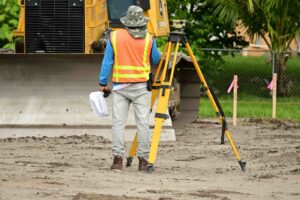A Home Survey Level 1 typically costs between £300-£900, whereas full structural surveys are more expensive, ranging from around £630 to £1,500. A house survey is a comprehensive and systematic examination of a property’s condition, carried out by a qualified and experienced surveyor.
The process involves a detailed inspection of both the interior and exterior of the property, including its structural elements, fixtures and fittings. The surveyor assesses the building’s overall state, identifies any defects or issues, and provides a detailed report with recommendations for repairs and maintenance. The goal is to help buyers and homeowners understand the property’s condition.
Do I Need a House Survey?
Sometimes, yes. A house survey is often needed because it helps prospective buyers and current homeowners avoid unexpected and costly issues associated with a property. By identifying defects and potential problems, a survey allows buyers to make informed decisions about the purchase and negotiate with the seller if necessary.
For homeowners, a survey can be crucial in detecting maintenance needs and structural issues early on, preventing them from turning into more significant problems later. Some mortgage lenders may require a house survey to assess the property’s value and condition before approving a mortgage loan.
Can I Skip the House Survey to Save Money?
No. Skipping a house survey to save money is not recommended. While a survey may seem like an unnecessary expense, the information provided in them can be invaluable in helping you make a well-informed decision about the property.
A house survey can uncover hidden defects, structural problems, and maintenance issues that are not immediately apparent to an untrained eye. The cost of fixing these issues would outweigh the cost of the survey. The survey report can also be used as a negotiation tool to adjust the property’s price or request repairs from the seller.
How Long Does a House Survey Take?
The duration of a house survey depends on the type of survey and the size and complexity of the property. The most basic survey might take a few hours to complete and a more comprehensive one could take around half a day. On the other hand, the most detailed survey might take a full day or even longer to complete for larger or complex properties.
During the survey, the surveyor carefully inspects each part of the property and takes notes and photographs to include in the final report. This can take longer if they are being more comprehensive about it.
What Are House Survey Costs?
Level |
House Value |
Time Taken |
Cost |
|
RICS Level 1 Survey
|
£100,000 to £250,000 | Up to 1 hour | £300 to £500 |
|
RICS Level 1 Survey
|
£250,000 to £350,000 | Up to 1 hour | £500 to £600 |
|
RICS Level 1 Survey
|
£500,000 to £1,000,000 | Up to 1 hour | £700 to £900 |
|
RICS Level 2 Survey
|
£100,000 to £250,000 | 1 to 4 hours | £400 to £600 |
|
RICS Level 2 Survey
|
£250,000 to £350,000 | 1 to 4 hours | £600 to £700 |
|
RICS Level 2 Survey
|
£350,000 to £450,000 | 1 to 4 hours | £700 to £800 |
|
RICS Level 2 Survey
|
£500,000 to £1,000,000 | 1 to 4 hours |
£800 to £1,000
|
Source: householdquotes.co.uk/cost-of-a-house-survey
How Do I Find a Qualified Surveyor?
To find a qualified surveyor, be sure to look for individuals or companies that are members of the Royal Institution of Chartered Surveyors (RICS). RICS is a professional body that regulates chartered surveyors and maintains strict standards of professionalism and expertise.
You can search for RICS-accredited surveyors on the RICS website or seek recommendations from friends, family or your estate agent. Before choosing a surveyor, ensure they have experience in surveying properties similar to the one you intend to buy.
Will the Surveyor Provide a Valuation of the Property?
No. A RICS Condition Report does not include a property valuation.
However, both the RICS HomeBuyer Report and the RICS Building Survey typically provide an estimated market valuation of the property. This valuation is based on the surveyor’s assessment of the property’s condition and its current market value.
How Often Should I Get a House Survey Done?
A house survey is usually carried out when you purchase a property. However, if you plan to own the property for an extended period or undertake significant renovations, it can be a sensible idea to consider surveys every 5 to 10 years.
Regular surveys help you stay on top of any maintenance needs and identify potential issues early, which can save you from having to pay for expensive repairs later down the line. This can be particularly important for first-time buyers who are often putting a large portion of their savings towards a house purchase.
What Happens if My Survey Misses Something?
While a house survey is a detailed and thorough inspection, it may not be able to identify all potential issues with the property, especially those that are not visible or accessible during the survey. For instance, some defects might be hidden behind walls or under flooring and could only be discovered during more invasive investigations.
Can a House Survey Identify Pest Infestations?
Not usually. A standard house survey may not explicitly focus on pest infestations, but it may raise concerns if there are visible signs, such as pest droppings, gnaw marks or damage to woodwork.
If you suspect a pest problem, consider requesting a separate pest inspection from a qualified specialist. They can assess the property for signs of infestations and recommend appropriate measures for pest control.
Should I Get a Survey for a New-Build Property?
Yes, it can be a good idea to get a survey even for new-build properties. While new constructions generally are supposed to stick to high standards, there can still be defects that go unnoticed during the build process.
A survey of a new-build property can help ensure that it meets the promised specifications and has been constructed correctly. Identifying any defects early on allows the developer to address them before they become more significant problems.
Who Organises a Survey When Buying a House?
It is usually the responsibility of the prospective buyer to commission a house survey. The buyer will need to find a qualified and experienced surveyor and arrange for the survey to be conducted on the property they want to buy.
Concluding Thoughts
A house survey is an important step in the property-buying process. Choosing the right type of survey and a qualified surveyor can provide you with a detailed understanding of the property’s condition, allowing you to make informed decisions and avoid potential pitfalls.
The cost of the survey is a worthwhile investment, providing you with peace of mind and potentially saving you from significant expenses and stress down the line. The exact costs depend on your property value and the level of detail you want the surveyor to go into.



